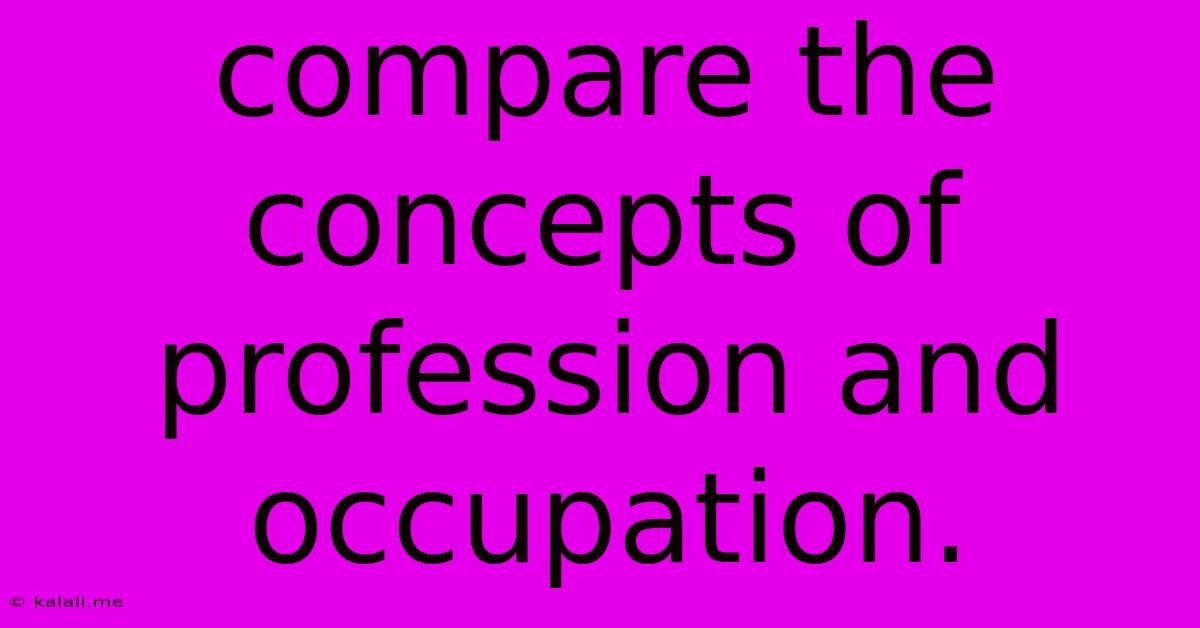Compare The Concepts Of Profession And Occupation.
Kalali
Jun 12, 2025 · 3 min read

Table of Contents
Profession vs. Occupation: What's the Difference?
Choosing a career path is a significant life decision, often involving pondering the nuances between a profession and an occupation. While both terms refer to work and earning a living, there are key distinctions that influence job satisfaction, earning potential, and societal perception. This article delves into the core differences between professions and occupations, shedding light on the factors that set them apart. Understanding these differences can help you make a more informed choice about your future career.
Defining "Profession"
A profession is more than just a job; it's a vocation characterized by a high degree of specialized knowledge, skills, and often, extensive formal education. Professionals typically undergo rigorous training, often involving years of study and apprenticeship, to achieve mastery in their field. This dedication translates to a commitment to ethical standards and a sense of public service. Think of doctors, lawyers, engineers, and architects – these are professions that demand specialized skills, adherence to a strict code of conduct, and ongoing professional development.
Key Characteristics of a Profession:
- Extensive Education and Training: Requires significant formal education, often including a university degree or advanced professional qualification.
- Specialized Knowledge and Skills: Possesses a unique and highly specialized body of knowledge and skills not easily acquired.
- Professional Organizations and Licensing: Often regulated by professional bodies that set standards, grant licenses, and enforce ethical codes.
- Autonomy and Independence: Professionals often exercise a high degree of autonomy and independent judgment in their work.
- Commitment to Public Service: A strong sense of responsibility to the public good and the ethical conduct of their work.
- High Earning Potential: Typically associated with higher earning potential compared to occupations.
Defining "Occupation"
An occupation, on the other hand, encompasses a wider range of jobs and tasks, encompassing both skilled and unskilled labor. While occupations may require training or apprenticeship, the level of formal education and specialization is generally lower than that required for professions. Occupations may be less regulated, with fewer stringent ethical codes or professional licensing requirements. Examples include tradespeople (plumbers, electricians), retail workers, administrative assistants, and many more.
Key Characteristics of an Occupation:
- Varied Educational Requirements: May require minimal training, vocational education, or on-the-job experience.
- Broader Skill Set: Skills are often more general and transferable across various roles.
- Less Regulation and Licensing: Often less regulated with fewer formal licensing requirements.
- Less Autonomy: Employees may work under closer supervision with less independent decision-making.
- Variable Earning Potential: Earning potential can vary widely depending on skills, experience, and industry.
Key Differences Summarized:
| Feature | Profession | Occupation |
|---|---|---|
| Education | Extensive formal education, often advanced degrees | Varied, may require minimal training or apprenticeship |
| Training | Rigorous and specialized training | Varied levels of training |
| Skills | Highly specialized and sophisticated skills | Broader and more general skills |
| Regulation | Highly regulated, licensing often required | Less regulated, licensing often not required |
| Autonomy | High degree of autonomy and independence | Variable levels of autonomy and independence |
| Ethical Codes | Strict adherence to ethical codes | Less stringent ethical codes |
| Public Service | Strong commitment to public service | Variable commitment to public service |
| Earning Potential | Generally higher | Variable, can be lower |
Conclusion
The distinction between a profession and an occupation lies primarily in the level of education, specialization, regulation, and ethical commitment. While both are vital components of a functioning society, understanding these nuances is crucial for individuals navigating career choices. Aspiring professionals should be prepared for extensive education and training, while those pursuing occupations may find more varied pathways to employment. Ultimately, the "best" choice depends on individual skills, interests, and career goals.
Latest Posts
Latest Posts
-
Which Of The Following Is An Example Of Positive Punishment
Jun 13, 2025
-
What Type Of Consumer Are Humans
Jun 13, 2025
-
The Unit Of Resistance Is The
Jun 13, 2025
-
Which Of The Following Is Not A Characteristic Of Minerals
Jun 13, 2025
-
The Unit Of Capacitance Is The
Jun 13, 2025
Related Post
Thank you for visiting our website which covers about Compare The Concepts Of Profession And Occupation. . We hope the information provided has been useful to you. Feel free to contact us if you have any questions or need further assistance. See you next time and don't miss to bookmark.